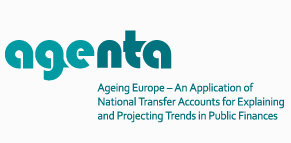Intergenerational Transfers
The European population is ageing rapidly. To study the sustainability of the welfare state and its implications on economic growth, it is necessary to have a good understanding of the monetary and non-monetary transfers received by, and given to, individuals over their life cycles. These transfers, either from public or non-public institutions, influence our economic decisions. However, the economic literature has paid little attention to this issue except for the analysis of public transfers.
Currently we are undertaking work within the following areas:
AGENTA
Ageing Europe: An Application of National Transfer Accounts (NTA) for Explaining and Projecting Trends in Public Finances
Alexia Prskawetz, Bernhard Hammer, Miguel Sánchez-Romero
The AGENTA project aims at explaining the past and forecasting the future of taxes and public transfers and services in the light of demographic change in the European Union. Conceptually AGENTA puts a special emphasis on
- the links between the public and the non-public sector (particularly households) in providing resources in the dependent periods of the life cycle;
- the links between the different components of the public budget (current investments in the health and other human capital of children shape the need for services and the size of the public budget in the future);
- the definition of stages of the life cycle, such as childhood, active age and old age, in particular the age of becoming old, and how they interrelate to impact on both economic activity during the life-cycle and the timing of, and circumstances surrounding, the retirement decision.
In other words, we emphasise that trends in the public sector cannot be fully understood without taking non-public institutions into account and doing so over the life cycles of successive cohorts of the population. The guiding principle of the AGENTA project is to provide evidence-based policy proposals to ensure long-term sustainability of public finances in Europe.
The acronym of the project, AGENTA, has a double reference. We will use the new method of National Transfer Accounts (NTA, see www.ntaccounts.org) to analyse the increasing average AGE that constitutes the ageing of European societies. In addition, the output of the project will be strongly policy-oriented, offering an AGENDA for preparing for old-age societies.
The project is funded by the European Union as part of the FP7 framework and co-ordinated by VID.
AgeWellAccounts
Wellbeing from a life course perspective
Alexia Fürnkranz-Prskawetz, Bernhard Hammer, Sonja Spitzer
The AWA project focuses on the measurement and analysis of wellbeing from a life course perspective. A comprehensive range of wellbeing measures is used for this purpose, including measures of the economic situation of people, exposure to stress and time pressure as well as measures of happiness and health status. The aim of the project is to identify the specific needs and wants at each life stage. With this knowledge, we gain a better understanding of the way societal institutions can adapt to be sustainable under demographic change and at the same time serve the people in the best possible way.

